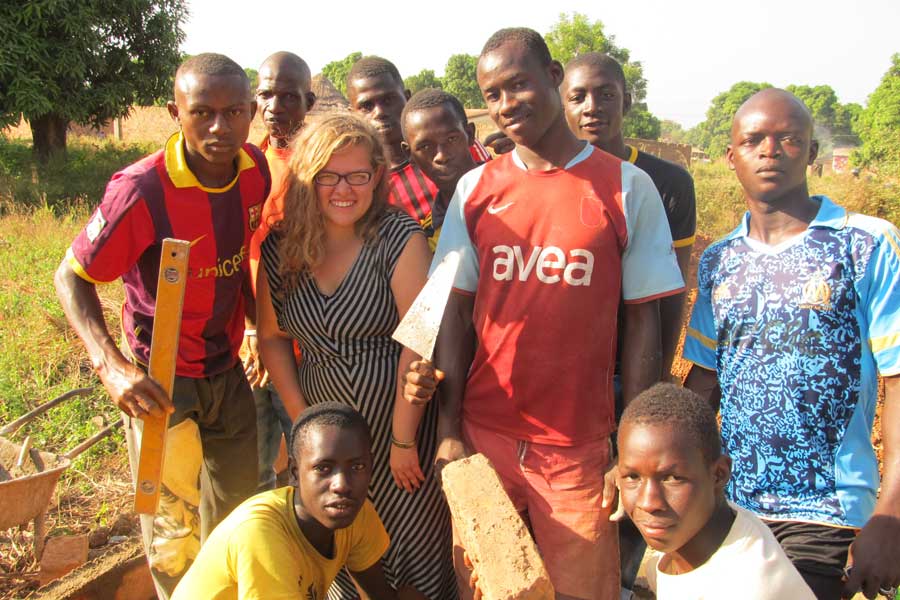Knox Stories
Michael Takeo Magruder Named First Knight Fund Distinguished Artist-in-Residence
Knox College will host its first-ever Knight Fund Distinguished Artist-in-Residence, Michael Takeo Magruder, from September 16 to September 30, 2025
Venture Boldly

Office of Communications
2 East South Street
Galesburg, IL 61401


Laurel Tippe, a senior from Iowa City, Iowa, is doing summer research for her College Honors project that looks at the variety of ways women use music as a means for social and political action. Laurel is majoring in music and educational studies and received Richter support for her research.
Tell us more about your research.
I am attending two large women's music festivals this summer: the National Women's Music Festival and the Womyn's Music Festival. I am collecting interviews of the musicians, as well as attendants of the festival. I will take the information and stories gathered this summer and combine it with my study abroad experience in the fall in Guinea. Ultimately, the project will be a cross-cultural comparison of female musicians using music to make themselves heard about important social and political issues.
Describe your interviews so far.
My interviews have been incredible so far. Everyone has been very willing to talk about the way they choose to make music and the way they feel they can change things for the better with their music. I wanted the interviews to be very conversational, as if the musicians were talking to a member of their family. The questions I've created allow the musicians to be honest and open. The festival atmosphere allows for a very trusting environment in which everyone feels like they share something in common.
How did you learn about this opportunity?
I learned about the Honors project opportunity while at Knox. The Gerald and Carol Vovis Center for Research and Advanced Study was instrumental in making this research a reality for me. I applied for a Richter grant and received money to attend the festivals, as well as money for traveling. My advisors were also very helpful in encouraging me to pursue independent research and to hone in on my final topic.
Can you cite an example of how your in-classroom experiences at Knox have benefited you during your research?
My music classes at Knox have contributed greatly to the research process. It has allowed me to talk to the musicians in a more in depth, yet personal way. My experiences working with so many different musicians at Knox have exposed me to so many different music making methods, and I have come to realize that the way a person creates his or her music and the motivation behind the music says a lot about the person.
How do you think this experience will benefit you in terms of your education and future career plans?
I eventually hope to pursue a graduate degree in ethnomusicology. This research is my main preliminary experience with field research and ethnographic writing. The experience will be incredibly beneficial in preparing me for graduate work. Ultimately, I would love to continue the project past just a comparison of female folk musicians in America and female musicians in Guinea. It is my hope to collect stories and recordings from female musicians from as many different places as possible. The female voice in the music world needs representation, and I hope to play some small part in that.
What has been the coolest part of your project?
The coolest part of my project so far was getting to talk with so many musicians in a really in-depth and personal way. I had some very philosophical conversations about the fundamental reasons why music is so incredibly powerful and life changing. It was amazing to get to honestly speak with musicians who have made it their life to make a difference with music.
What inspired you to pursue the project?
I was taking Professor Nikki Malley's Music of the African Diaspora when I initially got the idea for this project. We were talking about female musicians in Mali who had reappropriated hunter's music and turned it into a musical tradition that often speaks out against women marrying too young, men having multiple wives, etc. in a way that would not be possible through just spoken word. I applied for a study abroad program to Mali. Circumstances have caused the trip to be to Guinea instead, but the musical tradition is very similar throughout the region. After learning about wassalou music (the tradition in Mali), I knew I wanted to incorporate female musicians doing similar things with music in my final research project at Knox.
What do you expect to learn through your research?
I expect to learn a lot about the variety of motivations behind making such progressive and change oriented music. I think it will be incredible to see this happening in a musical world so different from the Western tradition. I hope to learn about the different ways these women view themselves as agents of change.
Published on July 23, 2012